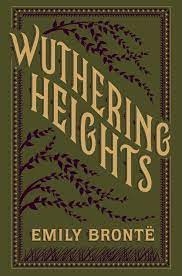Wuthering Heights Page #8
Wuthering Heights is an 1847 novel by Emily Brontë, initially published under the pseudonym Ellis Bell. It concerns two families of the landed gentry living on the West Yorkshire moors, the Earnshaws and the Lintons, and their turbulent relationships with Earnshaw's adopted son, Heathcliff.
“Always at nine in winter, and rise at four,” said my host, suppressing a groan: and, as I fancied, by the motion of his arm’s shadow, dashing a tear from his eyes. “Mr. Lockwood,” he added, “you may go into my room: you’ll only be in the way, coming downstairs so early: and your childish outcry has sent sleep to the devil for me.” “And for me, too,” I replied. “I’ll walk in the yard till daylight, and then I’ll be off; and you need not dread a repetition of my intrusion. I’m now quite cured of seeking pleasure in society, be it country or town. A sensible man ought to find sufficient company in himself.” “Delightful company!” muttered Heathcliff. “Take the candle, and go where you please. I shall join you directly. Keep out of the yard, though, the dogs are unchained; and the house—Juno mounts sentinel there, and—nay, you can only ramble about the steps and passages. But, away with you! I’ll come in two minutes!” I obeyed, so far as to quit the chamber; when, ignorant where the narrow lobbies led, I stood still, and was witness, involuntarily, to a piece of superstition on the part of my landlord which belied, oddly, his apparent sense. He got on to the bed, and wrenched open the lattice, bursting, as he pulled at it, into an uncontrollable passion of tears. “Come in! come in!” he sobbed. “Cathy, do come. Oh, do—once more! Oh! my heart’s darling! hear me this time, Catherine, at last!” The spectre showed a spectre’s ordinary caprice: it gave no sign of being; but the snow and wind whirled wildly through, even reaching my station, and blowing out the light. There was such anguish in the gush of grief that accompanied this raving, that my compassion made me overlook its folly, and I drew off, half angry to have listened at all, and vexed at having related my ridiculous nightmare, since it produced that agony; though why was beyond my comprehension. I descended cautiously to the lower regions, and landed in the back-kitchen, where a gleam of fire, raked compactly together, enabled me to rekindle my candle. Nothing was stirring except a brindled, grey cat, which crept from the ashes, and saluted me with a querulous mew. Two benches, shaped in sections of a circle, nearly enclosed the hearth; on one of these I stretched myself, and Grimalkin mounted the other. We were both of us nodding ere any one invaded our retreat, and then it was Joseph, shuffling down a wooden ladder that vanished in the roof, through a trap: the ascent to his garret, I suppose. He cast a sinister look at the little flame which I had enticed to play between the ribs, swept the cat from its elevation, and bestowing himself in the vacancy, commenced the operation of stuffing a three-inch pipe with tobacco. My presence in his sanctum was evidently esteemed a piece of impudence too shameful for remark: he silently applied the tube to his lips, folded his arms, and puffed away. I let him enjoy the luxury unannoyed; and after sucking out his last wreath, and heaving a profound sigh, he got up, and departed as solemnly as he came. A more elastic footstep entered next; and now I opened my mouth for a “good-morning,” but closed it again, the salutation unachieved; for Hareton Earnshaw was performing his orison sotto voce, in a series of curses directed against every object he touched, while he rummaged a corner for a spade or shovel to dig through the drifts. He glanced over the back of the bench, dilating his nostrils, and thought as little of exchanging civilities with me as with my companion the cat. I guessed, by his preparations, that egress was allowed, and, leaving my hard couch, made a movement to follow him. He noticed this, and thrust at an inner door with the end of his spade, intimating by an inarticulate sound that there was the place where I must go, if I changed my locality. It opened into the house, where the females were already astir; Zillah urging flakes of flame up the chimney with a colossal bellows; and Mrs. Heathcliff, kneeling on the hearth, reading a book by the aid of the blaze. She held her hand interposed between the furnace-heat and her eyes, and seemed absorbed in her occupation; desisting from it only to chide the servant for covering her with sparks, or to push away a dog, now and then, that snoozled its nose overforwardly into her face. I was surprised to see Heathcliff there also. He stood by the fire, his back towards me, just finishing a stormy scene with poor Zillah; who ever and anon interrupted her labour to pluck up the corner of her apron, and heave an indignant groan. “And you, you worthless—” he broke out as I entered, turning to his daughter-in-law, and employing an epithet as harmless as duck, or sheep, but generally represented by a dash—. “There you are, at your idle tricks again! The rest of them do earn their bread—you live on my charity! Put your trash away, and find something to do. You shall pay me for the plague of having you eternally in my sight—do you hear, damnable jade?” “I’ll put my trash away, because you can make me if I refuse,” answered the young lady, closing her book, and throwing it on a chair. “But I’ll not do anything, though you should swear your tongue out, except what I please!” Heathcliff lifted his hand, and the speaker sprang to a safer distance, obviously acquainted with its weight. Having no desire to be entertained by a cat-and-dog combat, I stepped forward briskly, as if eager to partake the warmth of the hearth, and innocent of any knowledge of the interrupted dispute. Each had enough decorum to suspend further hostilities: Heathcliff placed his fists, out of temptation, in his pockets; Mrs. Heathcliff curled her lip, and walked to a seat far off, where she kept her word by playing the part of a statue during the remainder of my stay. That was not long. I declined joining their breakfast, and, at the first gleam of dawn, took an opportunity of escaping into the free air, now clear, and still, and cold as impalpable ice. My landlord halloed for me to stop ere I reached the bottom of the garden, and offered to accompany me across the moor. It was well he did, for the whole hill-back was one billowy, white ocean; the swells and falls not indicating corresponding rises and depressions in the ground: many pits, at least, were filled to a level; and entire ranges of mounds, the refuse of the quarries, blotted from the chart which my yesterday’s walk left pictured in my mind. I had remarked on one side of the road, at intervals of six or seven yards, a line of upright stones, continued through the whole length of the barren: these were erected and daubed with lime on purpose to serve as guides in the dark, and also when a fall, like the present, confounded the deep swamps on either hand with the firmer path: but, excepting a dirty dot pointing up here and there, all traces of their existence had vanished: and my companion found it necessary to warn me frequently to steer to the right or left, when I imagined I was following, correctly, the windings of the road.
Translation
Translate and read this book in other languages:
Select another language:
- - Select -
- 简体中文 (Chinese - Simplified)
- 繁體中文 (Chinese - Traditional)
- Español (Spanish)
- Esperanto (Esperanto)
- 日本語 (Japanese)
- Português (Portuguese)
- Deutsch (German)
- العربية (Arabic)
- Français (French)
- Русский (Russian)
- ಕನ್ನಡ (Kannada)
- 한국어 (Korean)
- עברית (Hebrew)
- Gaeilge (Irish)
- Українська (Ukrainian)
- اردو (Urdu)
- Magyar (Hungarian)
- मानक हिन्दी (Hindi)
- Indonesia (Indonesian)
- Italiano (Italian)
- தமிழ் (Tamil)
- Türkçe (Turkish)
- తెలుగు (Telugu)
- ภาษาไทย (Thai)
- Tiếng Việt (Vietnamese)
- Čeština (Czech)
- Polski (Polish)
- Bahasa Indonesia (Indonesian)
- Românește (Romanian)
- Nederlands (Dutch)
- Ελληνικά (Greek)
- Latinum (Latin)
- Svenska (Swedish)
- Dansk (Danish)
- Suomi (Finnish)
- فارسی (Persian)
- ייִדיש (Yiddish)
- հայերեն (Armenian)
- Norsk (Norwegian)
- English (English)
Citation
Use the citation below to add this book to your bibliography:
Style:MLAChicagoAPA
"Wuthering Heights Books." Literature.com. STANDS4 LLC, 2025. Web. 14 Mar. 2025. <https://www.literature.com/book/wuthering_heights_1627>.








Discuss this Wuthering Heights book with the community:
Report Comment
We're doing our best to make sure our content is useful, accurate and safe.
If by any chance you spot an inappropriate comment while navigating through our website please use this form to let us know, and we'll take care of it shortly.
Attachment
You need to be logged in to favorite.
Log In